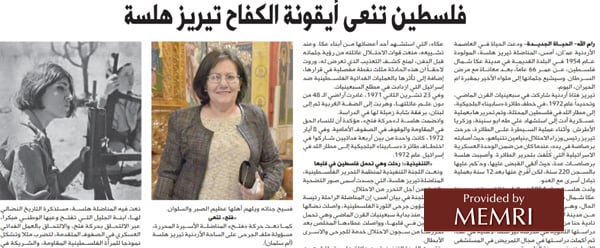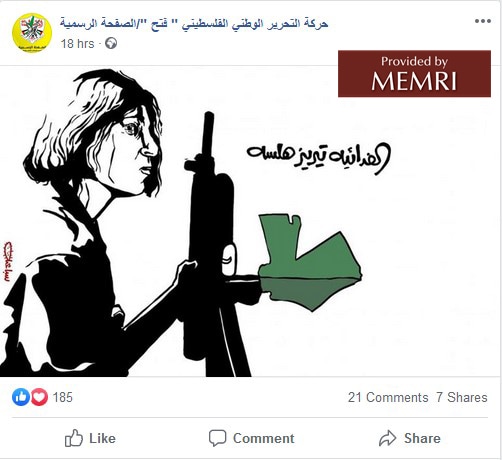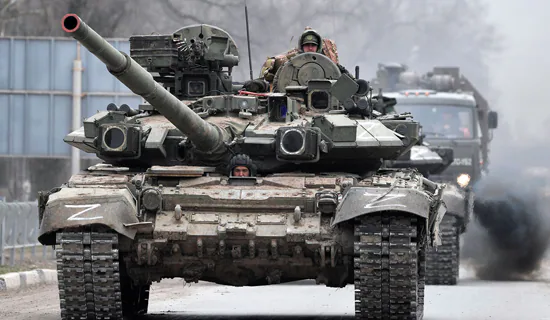In recent months, the Palestinian Authority (PA) and the Fatah movement have continued their tradition of glorifying terrorists who carried out attacks against Israelis, including civilians. [1] This was manifested in reports and articles published in the PA media, and in official statements by Fatah, which lavished praise on terrorists, including Theresa Helsa, a member of the Black September cell who took part in the hijacking of the Sabena airliner from Brussels to Lod airport in May 1972, in which one hostage was killed, and Dalal Al-Mughrabi, a Fatah member who participated in the March 1978 Coast Road massacre, in which many Israelis were killed and wounded. The articles and statements described the two as courageous fighters and models for emulation.
Fatah and PA officials and media also spoke in praise of Khalil Al-Wazir aka Abu Jihad, who was Yasser Arafat's deputy and head of Fatah's military wing and was responsible for the murder of dozens of Israelis in terror incidents in the 1970s and 80s. Another figure honored was 'Alaa Al-Din Al-Bazian, who was sentenced in 1986 to life in prison for the murder of an Israeli woman, was released as part of the Shalit prisoner exchange and was subsequently was arrested again.
The following are translated excerpts from the articles and statements.
PA Mouthpiece, Fatah Eulogize Theresa Helsa, Who Participated In The Hijacking Of A Passenger Plane, As An Emblem And Role-Model
Theresa Helsa, a Christian Jordanian of Palestinian origin who participated in the hijacking of the Sabena airliner, died on March 28, 2020 in Jordan, and was lavishly eulogized in the PA daily Al-Hayat Al-Jadida and in obituaries posted by Fatah and by its Shabiba youth movement.
Al-Hayat Al-Jadida: Theresa Helsa, An Icon Of The Palestinian Struggle, Wounded Binyamin Netanyahu
Al-Hayat Al-Jadida devoted the front-page article of its March 29 issue to Theresa Helsa and the hijacking in which she participated. The article, headlined "Palestine Announces the Passing of Theresa Helsa, an Icon of the Struggle," said: “The fighter Theresa Helsa died yesterday in the Jordanian capital of Amman, aged 66… As a young Jordanian woman during the 1970s – in 1972 to be precise – she participated in the hijacking of the Belgian flight to Lod airport in occupied Palestine, which was [later] freed in an [Israeli] military operation… During the [Israeli] takeover of the plane, Theresa wounded the [current] prime minister of the occupation government, Binyamin Netanyahu, who was part of the Israeli military unit that was tasked with freeing the plane, [by] shooting a bullet that hit him in the hand. Helsa, who sustained several bullet wounds, was arrested and sentenced to 220 years in prison, but was released 12 years later as part of a prisoner exchange deal with the enemy.
"Helsa was born in 1954 to a Christian Jordanian family in the old city of Acre in northern occupied Palestine… She decided to join the armed struggle as a Fatah member… On November 23, 1971 she left the 1948 territories without her family's knowledge, escaped to the West Bank and from there to Lebanon… She joined the Fatah movement and proved that women were entitled [to be part of] the resistance and [fight] on the front. On May 8, 1972, she was one of four fida'iyyoun [self-sacrificing fighters] who took part in the hijacking of the Belgian Sabena airliner [en route to] Lod airport in Israel."[2]

The article in Al-Hayat Al-Jadida: Palestine Announces Death Of Icon Of Struggle Theresa Helsa
Fatah: Helsa Was A Shining Example Of A Woman Who Joined The Path Of Struggle And Martyrdom
An obituary for Helsa posted on Fatah's official Facebook page stated: "It is with sorrow and anguish that the Fatah movement mourns the fighter and released prisoner Theresa Helsa, Umm Salman, who was in charge of the injured dossier in Jordan.[3] For those who do not know, Theresa is a Jordanian from Al-Karak and her mother was a Palestinian from Acre. She was the first female Arab fida'i. In 1972, when she was 17 years old, this Jordanian Christian hijacked a passenger plane carrying Israelis in order to demand the release of Jordanian and Palestinian prisoners. She was caught… and sentenced to two life sentences plus 40 years… [but] she was released in 1983 in a prisoner exchange deal… [Helsa] was a shining example of a woman fighter and [in terms of] her position on the role of women at the forefront of the resistance…"[4]
An obituary posted by Fatah’s youth movement, the Shabiba, stated: "Helsa joined the military fida’i action on the front, and was an emblem and example of a fighting Palestinian woman who carried out resistance and joined the arena of resistance and self-sacrifice. The path of the fighter Helsa will remain alive in the hearts and minds of the young generation and of all Palestinian generations. We know that today she left us in body, but she was and will remain alive in [our] memory for generations to come." [5]

Poster in memory of Helsa on the Fatah Facebook page. The gun cartridge is shaped like a map of Jordan and Palestine (Facebook.com/officialfateh1965/posts, March 28, 2020)

Portrait of Helsa on the Fatah Facebook page: "Her fingers are candles of liberty and she is a legend the likes of which will never come again (Facebook.com/officialfateh1965/posts, March 28, 2020)
Articles In PA Daily: Theresa Helsa Is A Heroine Who Proved That Women Have An Important Role In The Struggle
Journalist ‘Omar Hilmi Al-Ghoul devoted his April 1, 2020 column in Al-Hayat Al-Jadida to Helsa, writing: "When she arrived in Beirut and asked to join the Fatah movement, she confused the commanders she met, and some of them even suspected her of being a spy sent by the Israeli security apparatuses. But the heroic Theresa demonstrated and proved her [Palestinian] identity by training for the fida'i operation to which she was assigned along with four of her heroic comrades… [namely] the hijacking of the Belgian Sabena airliner... in order to exchange the Israeli and Zionist hostages with some imprisoned heroic freedom [fighters incarcerated] in the prisons of the colonialist Israel…
"Theresa was sentenced to four life sentences, [but] spent [only] 10 years in jail, [since] she was released in a prisoner exchange deal in 1983. After her release she rejoined the struggle. She did not renege on the choice she had made in 1971, but remained on the front lines of the national struggle even after her marriage and the birth of her three children. In her pioneering action, this courageous woman proved several things, chiefly that women have an important role in life in general, and in the struggle [against Israel] in particular, and that their role is no less important than the men’s. She bolstered the national and pan-Arab positions, showing that nationality is above any consideration of gender, religion or ethnicity… [Being a Christian], she proved that religion has nothing to do with nationalism and pan-Arabism, since religion is for God and the homeland is for all…”[6]
A March 31 article by ‘Issa Al-Hafiz in Al-Hayat Al-Jadida stated: "[Helsa] was a Jordanian flower whose roots grew in Karak in southern Jordan but reached all the way to northern Palestine, showing the entire world that the Arab nation is one and shares the same concerns, hopes and destiny. She was an icon of Palestine and Jordan, who embodied the glorious union between the two banks of the [Jordan] river, between the mosque and the church and between the sons of the Arab nation, saying 'Palestine is what unites us all'… May God have mercy on our martyrs and place them in Paradise. To Allah we belong and to Him we return [Quran 2:156]."[7]
Fatah, PA On Dalal Mughrabi: She Is A Legend That Will Never Die, A Heroine Renowned For Her Courage
March also saw the 42nd anniversary of the death of Dalal Mughrabi, who participated in the March 11, 1978 Coast Road massacre in March 1978, in which 35 Israelis were killed and 71 were wounded. The PA and Fatah regularly mark this anniversary with laudatory reports and articles about her.[8] Al-Hayat Al-Jadida published an article on Dalal Al-Mughrabi, "The Legend That Will Never Die," outlining her biography and repeating the Palestinian version of the attack, which falsely describes it as an attack on soldiers rather than civilians. Describing the attack as a legitimate and heroic military action, the article stated: "Al-Mughrabi was born in 1958 in a Palestinian refugee camp in Beirut, to a family from Jaffa that fled to Lebanon after the Nakba of 1948. She studied at the UNRWA primary and junior high schools in the camp, and already as a schoolgirl decided that she would join the ranks of the Palestinian revolution and the Fatah fighters. She took many lessons on fighting and guerilla warfare, and trained with various kinds of weapons. In these courses she stood out for her courage, bravery and intense patriotism…

The article on Dalal Al-Mughrabi in Al-Hayat Al-Jadida
"Dalal and her team managed to reach Tel Aviv and hijack a bus full of soldiers, and waged a firefight with Israeli forces and others outside the bus. The action resulted in hundreds of killed and wounded on the Israeli side, and in light of these heavy losses, the Israeli government dispatched a special unit, under the command of Ehud Barak, to intercept the bus and kill or arrest those in it. [This unit] used planes and tanks to besiege the [Palestinian] fighters, prompting Dalal Al-Mughrabi to blow up the bus with everyone in it, killing the Israeli soldiers. When the [Palestinian fighters] ran out of ammunition, Barak ordered to spray them with machineguns, and all of them were killed."[9]
Fatah’s spokesman in Europe, Jamal Nazzal, shared the article on his Facebook page, along with a portrait of Al-Mughrabi captioned "The martyred fighter Dalal Al-Mughrabi, heroine of the Coast [Road] attack, the fighter who founded the Palestinian Republic."[10]

Portrait of Dalal Al-Mughrabi on Jamal Nazzal's Facebook page
PA Mouthpiece, Fatah Praise Abu Jihad And Attacks He Planned
Marking the 32nd anniversary of the assassination of Khalil Al-Wazir, aka Abu Jihad, Fatah and PA officials, and PA newspapers praised him and his activity. Abu Jihad, who was head of Fatah's military wing and deputy to Yasser Arafat, masterminded many attacks in the 1970s and 80s that killed dozens of Israeli civilians.
Al-Hayat Al-Jadida Celebrates Abu Jihad's Terror Attacks
On April 17, Al-Hayat Al-Jadida published a full list of the attacks planned by Abu Jihad. It stated: "The life of Abu Jihad, [aka] Khalil Al-Wazir, from his birth in Ramla on October 10, 1935 until the moment of his martyrdom on the morning of April 16, 1988 in Tunis, can be summed up as follows: 'Expelled, lived as a revolutionary, and died a martyr, in the path of the return to liberated Palestine...'
"Among the military attacks planned by Abu Jihad were: blowing up the Zohar reservoir [in the western Negev] in 1955; blowing up the water pipeline – the Eilaboun tunnel [of the Israel National Water Carrier] – in 1965; the operation [to take over] the Savoy Hotel in Tel Aviv in 1975 [in which 11 Israelis were killed]; the operation to blow up a booby-trapped refrigerator in Jerusalem in 1975 [killing 15 Israeli civilians]; the operation to murder top sapping expert Albert Levy and his aide in Nablus in 1976;[11] the Dalal Al-Mughrabi operation [Coast Road attack] in 1978; the operation to shell Eilat port in 1979, and the firing of Katyushas on the northern settlements in 1981.
"Additionally, the occupation blamed the martyr Abu Jihad for the capture of eight Israeli soldiers in Lebanon, [who were later] exchanged for 5,000 Lebanese and Palestinian prisoners. Likewise, he drew up the plan to attack and bomb the headquarters of the Israeli military governor in Tyre [Lebanon] in 1982 [in which 91 were killed] and in directing the war of attrition in southern Lebanon from 1982 through 1984 and the Dimona reactor operation in 1988 [hijacking a bus transporting employees of the nuclear research center, killing three Israelis]..."[12]
Fatah: We Will Continue On Abu Jihad's Path Of Struggle And Sacrifice
Fatah also published an anniversary announcement stating that it "stresses that the struggle will continue with the same determination and aggression as the path and principles of the leader and national symbol, the Emir of Martyrs Khalil Al-Wazir – Abu Jihad – and of all [Fatah's] first leaders and founders..."
It continued: "The path of this leader, who from the very beginning stood alongside Abu Ammar [Arafat] in establishing the movement, is the path of struggle, sacrifice, absolute devotion, and abnegation of ego... The leader Abu Jihad, who stood fast alongside the historic leader Yasser Arafat and the leaders and founders in all the battles of the revolution, worked to establish the principles of martyrdom and sacrifice... The sacrifice of the Emir of Martyrs, of all the martyrs of the Palestinian people, and of the heroic prisoners will not be in vain. Fatah continues on the path of Abu Ammar, Abu Jihad, and Abu Iyyad,[13] until our people achieves its liberation, its national independence, and its sovereignty on the land of its historic homeland Palestine."[14]
Fatah spokesman and National Palestinian Council member Osama Al-Qawasma dedicated a post on his Facebook page to Abu Jihad's memory, writing: "Khalil Al-Wazir Abu Jihad – the Emir of Martyrs – Peace be upon your pure soul. As long as we live, we will continue to espouse an honorable way of life full of struggle and giving, that we will learn and memorize. [This is] the path we learned, generation after generation, whose main tenets are the homeland, honor, sacrifice, and pride, and whose symbols are Khalil Al-Wazir and Fatah. May God have mercy on you..."[15]

Al-Qawasma's Facebook post
PA Chairman For Prisoners' Affairs: We Promise To Continue Executing The Will And Testament Of Abu Jihad
An article by PA Chairman for Prisoners' Affairs Qadri Abu Bakr, published by the Al-Quds daily on April 19, stated: "Thirty-two years have passed since Commander Khalil Al-Wazir, Abu Jihad, the Emir of Martyrs, was martyred, and we are still traumatized by the loss of a bold and aggressive leader who was tough in the face of the enemies and shook the throne of their oppressing entity, a fighter who believed in the necessity of victory, who did not recognize the impossible – and in his time we [too] did not recognize this [concept]... We promise you, my brother and teacher, that we will continue to serve our Palestinian people and the national cause and to preserve your will [and testament] that is a compass [showing us the way] to liberation and victory. Glory is yours, great servant of Palestine. Eternity and peace upon your mighty soul, our Emir of the Martyrs."[16]
Article In Al-Quds Praises Terrorist Who Murdered Israeli Civilian: He Is A Burning Torch, Palestine Abides Within Him
In an article published in Al-Quds on April 11, author and released prisoner Walid Al-Hodali praised the prisoner 'Alaa Al-Din Al-Bazian, member of a terror squad that carried out shooting attacks, was sentenced in 1986 to life in prison for the murder of an Israeli civilian woman, was freed in the Gilad Shalit prisoner exchange, and was rearrested. Calling for his release, Al-Hodali wrote:
"...He was and remains a burning torch with patriotic spirit, as if this great Palestine abides within him, with all its details and all the hopes and longings of its people... Not one grain of the land [of Palestine] is missing from his heart, and politics have not diverted him from any of its [Palestine's] rights. He has continued to hold on to the embers of the [Palestinian] right and freedom, in all aspects of the [Palestinian] cause, without weakening or bending before any of the false claims of peace. He has continued to hold on to weapons, and has not backed down one bit, not even as a tactic or for [political] maneuvering.
"'Alaa Al-Din is an eternal school teaching history books, setting out the glorious future and anchoring the principles of full freedom and unflawed independence... We want this light [‘Alaa Al-Din] to be outside prison walls, because he is in essence a special light. In effect, the time has come for this wise knight to return to his life..."[17]
[1] For earlier examples, see MEMRI Special Dispatch No. 7980 - Palestinian Authority, Fatah Continue Official Support And Encouragement Of Armed Struggle Against Israel – April 2, 2019; Special Dispatch No. 7954 - Praise, Admiration In Palestinian Authority, Jordan For Palestinian Terrorist Who Killed Israelis In West Bank – March 22, 2019.
[2] Al-Hayat Al-Jadida (PA), March 29, 2020.
[3] Helsa was chair of the Jordanian Association for the Injured of the Palestinian Revolution.
[4] Facebook.com/officialfateh1965, March 28, 2020.
[5]Al-Hayat Al-Jadida (PA), March 29, 2020.
[6] Al-Hayat Al-Jadida (PA), April 1, 2020.
[7] Al-Hayat Al-Jadida (PA), March 31, 2020.
[8] See e.g., MEMRI Special Dispatch No. 7497 - Columnist In Jordanian Government Daily Expresses Love And Admiration For Palestinian Terrorist Dalal Al-Mughrabi: I Would Roll In The Dust Of Your Grave – May 30, 2018.
[9] Al-Hayat Al-Jadida (PA), March 12, 2020.
[10] Facebook.com/jamaldrnazzal, March 11, 2020. Nazzal’s statement about Dalal Al-Mughrabi finding the Palestinian Republic us a reference to a poem by Syrian poet Nizar Qabbani.
[11] Albert Levy and his assistant were killed by a bomb in Jerusalem.
[12] Al-Hayat Al-Jadida (PA), April 17, 2020.
[13] Salah Khalaf, aka Abu 'Iyyad, was a founder of Fatah and the Black September terrorist organization.
[14] Al-Hayat Al-Jadida (PA), April 17, 2020.
[15] Facebook.com/osama.qawasma, April 15, 2020.
[16] Al-Quds (East Jerusalem), April 19, 2020.
[17] Al-Quds (East Jerusalem), April 11, 2020.


.jpg)

